#masked autistic
Text
Unmasking isn’t always deliberate. Unmasking and being not able to mask can happen for multiple reasons. From burnout, to regression, to autism catatonia. There are multiple reasons why someone wouldn’t have control over their masking ability.
Unmasking isn’t always something someone wants and sometimes it happens beyond their control. Sometimes it happens unwillingly.
Unmasking Isn’t always deliberate, and that needs to be talked about more.
#zebrambles#autism#actually autism#actually autistic#unmasking#unmasking autism#autistic#masked autistic#masked autism
188 notes
·
View notes
Text
Bella Swan is Autistic: An Analysis
(Disclaimers: I enjoy Twilight in spite of its problematic elements, not because of them or in ignorance of them. There are as many different ways to be autistic as there are autistic people. Many allistic people will relate on some level to some aspects of the autistic experience; this does not make them autistic. This is all just my opinion, based on my experience as a late-diagnosed, low-support-needs autistic woman. I am aware this is not a brand-new original idea.)
I reread Twilight (I think for the first time since getting diagnosed 4 years ago) and I found a bunch of things I relate to Bella about. Below the cut is a list of some of her autism-related character traits with quotes for textual evidence. The links lead to articles explaining how these traits relate to autism. The list is ordered chronologically based on page number of the accompanied quotes. Page numbers are based on the paperback edition with ISBN-13: 9780316015844. A backslash in a quote signifies a paragraph break. I’ll update if I read any of the other books or rewatch the movies and anything new comes up.
Bella has trouble regulating her emotional expressions: she has to put conscious effort into how she presents herself
"I'd always been a bad liar" (p. 4).
"For some reason, my temper was hardwired to my tear ducts. I usually cried when I was angry, a humiliating tendency" (p. 25).
"I had never been enormously tactful" (p. 31).
"'My face is so easy to read -- my mother always calls me her open book'" (p. 50).
Bella is shy and a bit socially awkward: she avoids attention for fear of embarrassment
"Charlie wasn't comfortable with expressing his emotions out loud. I inherited that from him" (p. 7).
"Mr. Varner... was the only one who made me stand in front of the class and introduce myself. I stammered, blushed, and tripped over my own boots on the way to my seat" (p. 17).
"To my dismay, I found myself the center of attention for the rest of the week" (pp. 68-69).
Bella feels different from other people: she doesn’t know how to connect with others and feels pressure to fit in
"I didn't relate well to people my age. Maybe the truth was that I didn't relate well to people, period. Even my mother, who I was closer to than anyone else on the planet, was never in harmony with me, never on exactly the same page. Sometimes I wondered if I was seeing the same things through my eyes that the rest of the world was seeing through theirs. Maybe there was a glitch in my brain" (pp. 10-11).
"I answered honestly, instead of pretending to be normal like everyone else" (p. 47).
“'My mind doesn't work right? I'm a freak?' The words bothered me more than they should -- probably because his speculation hit home. I'd always suspected as much, and it embarrassed me to have it confirmed" (p. 181).
Bella has a unique sense of humor: other people don’t get her jokes and she doesn’t get other peoples’ jokes
"'You don't look very tan.' / 'My mother is part albino.' / He studied my face apprehensively, and I sighed. It looked like clouds and a sense of humor didn't mix. A few months of this and I'd forget how to use sarcasm" (p. 16).
“Bella was being unintentionally funny” (p. 367).
Bella finds comfort in routine: the change in routine from moving was difficult for her, and she felt better once the new routine became familiar
"I fell into the pattern of the familiar task gladly" (p. 33).
Bella is academically gifted: she finds assignments easier than her peers do, she has already read the books assigned in her English course
"'Were you in an advanced placement program in Phoenix?' / 'Yes'" (p. 47).
Bella enjoys being alone: she is introverted and enjoys solitary activities
"In a lot of ways, living with Charlie was like having my own place, and I found myself reveling in the aloneness instead of being lonely" (p. 54).
"I've never minded being alone" (p. 241).
Bella has motor difficulties: she is clumsy, uncoordinated, accident-prone, and bad at sports
"Possibly my crippling clumsiness was seen as endearing rather than pathetic, casting me as a damsel in distress" (p. 55).
"My sense of direction was hopeless; I could get lost in much less helpful surroundings" (p. 136).
Bella has special interests: Edward and books
"... no one else was as aware of Edward as I always was. No one else watched him the way I did" (p. 69).
"I was sitting in my room, researching vampires. What was wrong with me" (p. 135)?
"... they didn't know how preoccupied I could get when surrounded by books; it was something that I preferred to do alone" (p. 156).
Bella is perceived as different by others: a history of social exclusion is hinted at, Edward’s mind-reading doesn’t work on her
"'It's better if we're not friends,' he explained. 'Trust me.' / My eyes narrowed. I'd heard that before” (pp. 74-75).
"He enunciated every syllable, as if he were talking to someone mentally handicapped" (p. 83).
"'My mom always says I was born thirty-five years old and that I get more middle-aged every year'" (p. 106).
".'.. maybe your mind doesn't work the same way the rest of theirs do. Like your thoughts are on the AM frequency and I'm only getting FM'” (p. 181).
"'You're not like anyone I've ever known. ... / ... 'I have a better than average grasp of human nature. People are predictable. But you ... you never do what I expect. You always take me by surprise'" (p. 245).
Bella has sensory differences: she notices and is bothered by things others don’t and aren’t, she engages in sensory-seeking and sensory-avoiding behavior when stressed
"'People can't smell blood,' he contradicted. / 'Well, I can -- that's what makes me sick. It smells like rust ... and salt" (p. 100).
"I put in my headphones, hit Play, and turned up the volume until it hurt my ears. I closed my eyes, but the light still intruded, so I added a pillow over the top of my face" (pp. 129-130).
"'You're always crabbier when your eyes are black ... I expect it then' ... 'I have a theory about that'" (p. 171).
“For three and a half hours I stared at the wall, curled in a ball, rocking” (p. 425).
#twilight#the twilight saga#isabella swan#bella swan#stephenie meyer#autism#neurodivergent#masking#masked autistic#autistic headcanon#autistic hc#twilight headcanon#twilight hc#autistic bella swan#bella swan is autistic#autistic bella swan headcanon#twilight fan theory#feel free to add on#feel free to reblog#autistic characters#special interest infodump#projecting#twilight renaissance#twilight bella
58 notes
·
View notes
Text
“oh no I’m not autistic I don’t need routine”
I didn’t realize how much I needed routine until very recently. By routine I mean predictability and knowing what’s going to happen. One of my first clues was the complete breakdown I had when my job stopped with the things that made it possible for me to expect what my day would look like. I thought because I worked in cs on the phone I didn’t need routine, because every phone call was different... but I followed specific guidelines, I had the answers to questions, and each phone call had an intended outcome. Then when I started doing coaching (and that worked great!) but they’d suddenly tell me to get on the phone... I was lost. Like the switching of roles had me in tears because I couldn’t task switch, and then going to work became a nightmare because I could no longer trust what to expect when I came to work. I didn’t have my own cubicle anymore, scheduled tasks, meetings, and other things just... nope.
I didn’t realize this was a routine thing then, because I thought it was obvious that anyone would buckle under that. I was miserable. But it was just that... nothing else, right?
Well, the past couple of weeks I’ve realized that the reason why I know where everyone is going, what they’re doing, when they’re going and when they’ll be back... is because I need the predictability and knowing what’s going to happen. People think I’m ridiculous and asking because I want to be sneaky, like “when will you be back so I can sneak doing x” when I am just wildly uncomfortable with not knowing when certain things will happen. Being alone means I can plan to recharge, being around others means I have to mask to some extent (working on it) which is taxing, being around others means noise, it means the door opening, the dog barking, it means certain tasks will be started and I need to deal with not knowing what’s happening there and what’s making noise, it means I need to communicate. Knowing where they are will help me prepare a social script, knowing roughly what will be discussed, how to engage with them, it means I feel some semblance of control.
I’ve always known I was annoying asking all these questions and people just want to let be, but the not knowing is... so much anxiety
2 notes
·
View notes
Text
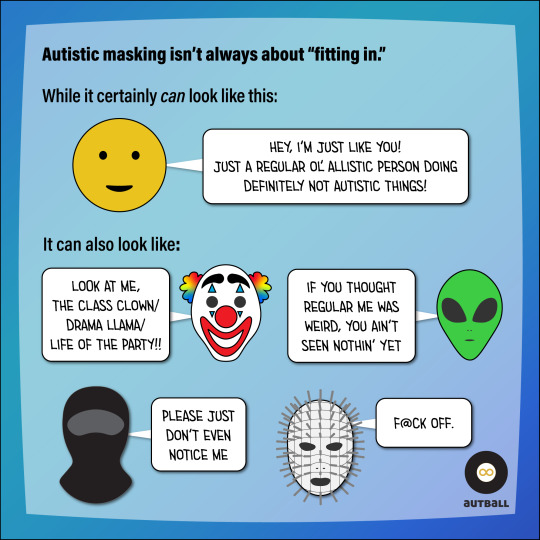
MASKING MYTHS BUSTED: “Masking = Acting NT.”
FALSE.
Autistic masking does not necessarily mean “pretending to be allistic/neurotypical," although you’d definitely be forgiven for thinking it does.
Non-autistic researchers have been referring to it as “camouflaging” for years, framing it as an intentional choice to suppress autistic traits and replace them with allistic ones in order to “blend in.” Doing an internet search on the term will return several similar results.
But now, Autistic researchers are in the game, and their take is much more nuanced and comprehensive than that. (Funny how that happens, isn’t it?)
They’ve found that:
- It CAN be intentional but is often subconscious and involuntary
- It is a protective response to trauma and feeling unsafe
- It is often about suppressing more than just autistic traits
- It is about identity management and being able to predict how people will treat you, not just “blending in”
Some people will lean into being “the bad kid” because they know that’s what people expect of them. Some people will even act “more autistic” because they know that’s what people expect of them. Others still will do things to attract attention in controllable, more “acceptable” ways to avoid attracting attention in unsafe, more stigmatizing ways. Not because they WANT to be that way, but because it lets them predict people’s responses better, which feels safer.
Also, there are Autistic people who can’t “pass” for non-autistic no matter how hard they try. That doesn’t mean they’re not masking. They may actually be working hard to suppress A LOT, they just can’t do everything to neuronormative standards.
None of these people will be accused of “blending in,” yet they are still masking their hearts out. When we assume they are not, we miss all the harm that masking is causing them. But they are suppressing themselves and suffering the consequences of that just as much as any Autistic person whose mask successfully says, “Hey, I’m just like you!”
(For more on this, please see the work of Dr. Amy Pearson and Kieran Rose.)
17K notes
·
View notes
Text
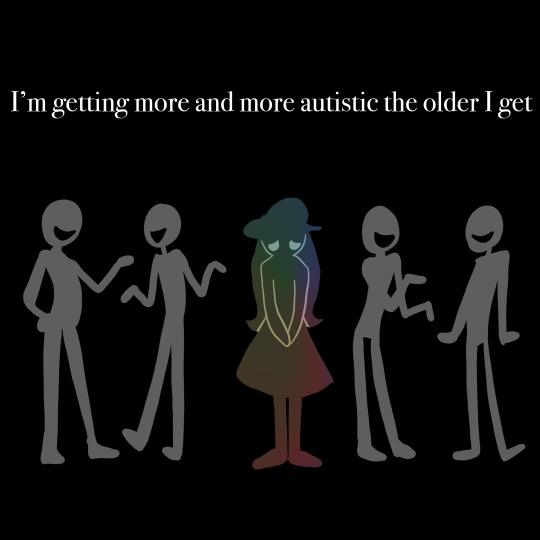
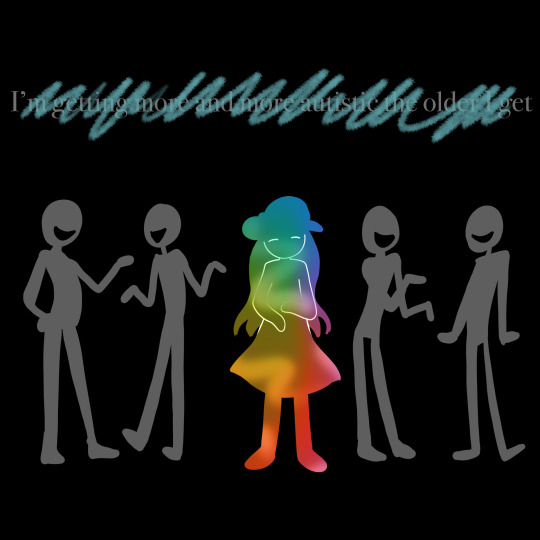
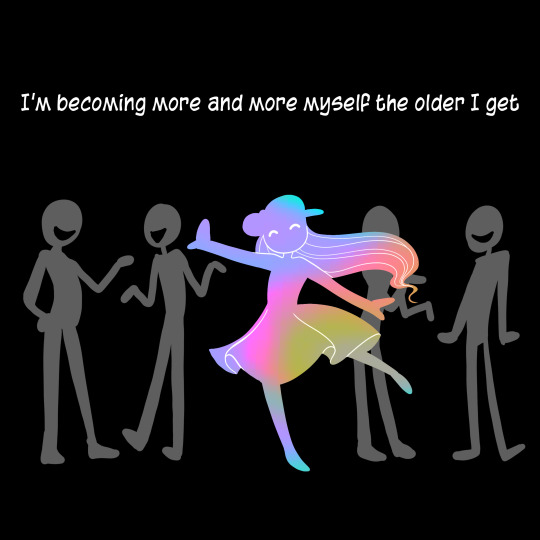
First art of the new year is all about re-structuring your internal monologue.
In my early 20s I was working full time in London with many social commitments and a variety of hustles and side projects.
In my later mid 20s I cater to many sensory and social drain needs I have and indulge in special interests while respecting my lower energy reserves and celebrating my different way of processing the world.
Did I get more autistic? Nah. I got less fake.
-
[Art description: Three panels showing figures on a black background. Long descriptions follow.
1. A drawing of OP as a person with hip-length hair and a dress standing sadly with her hands clapsed together in front of her. She is coloured a muted rainbow gradient. Behind her, two pairs of nondescript figures chat while smiling. White text says, ‘I’m getting more and more autistic the older I get.’ 2. OP’s colours are brighter, and her expression looks happier. Crayon-like scribbles have crossed out the text from the previous panel. 3. OP’s colours are vibrant, and she balances on one leg and throws her arms out as she dances. The text above has changed to say, ‘I’m becoming more and more myself the older I get.’ \End descriptions]
#urchin art#autism#autistic#neurodivergent#neurodiversity#actually autistic#autistic things#autistic adult#autistic artist#autistic community#listen- the process of unmasking every fiber of your fabricated being is difficult#figuring out who you are behind the mask is scary#but continuing to act in a play where only you got no script is officially cringe#(this is me waxing poetic I am very aware of the safety needs of masking but that's not the point)#the point is ask yourself#are you getting MORE xyz?#Or are you becoming MORE of you?
5K notes
·
View notes
Text
i love that neil spends majority of aftg being like omg they cannot find out that there is something wrong with me i have to be normal. and everyone who interacts with him is like Bro what the fuck is wrong with you
#he simply cannot mask#love that for him honestly#just like me fr#aftg#neil josten#go autistic boy go
4K notes
·
View notes
Text
neurotypicals will SWEAR they support you but the second you unmask they stare at you weirdly and question why you’re acting differently
thanks for supporting me! i feel so seen right now!! let me just put this back on…
#neurodivergent#autism#autistic experiences#autistic things#being autistic#adhd problems#neurodiverse stuff#neurodiversity#masking#social issues
6K notes
·
View notes
Text
when you're autistic and/or adhd, letting yourself get weird and a little embarrassing is an important part of unmasking and finding your authentic self
never be ashamed to just exist authenticly and don't be an ass about other people living without a sense that they need to hide parts of themselves from the world.
#actuallyautistic#actuallyadhd#neurodiverse#neurodivergent#autistic#masking#adhd#mental health#positivity
20K notes
·
View notes
Text
Ways Your Are Masking Your Autistic Traits Without Realizing
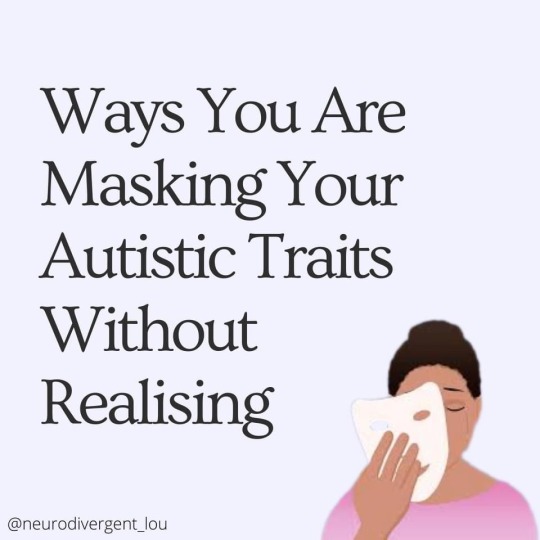
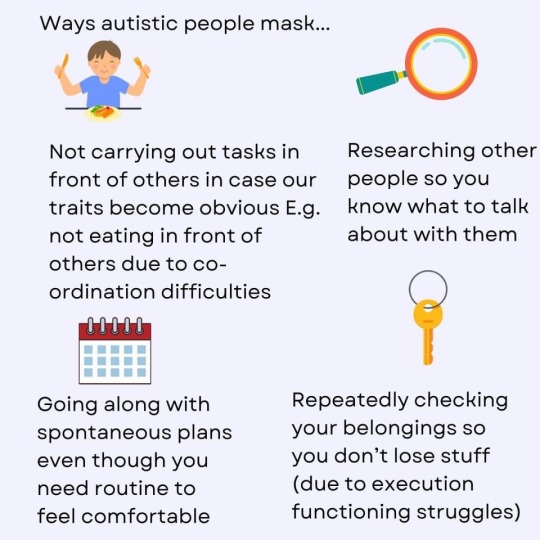

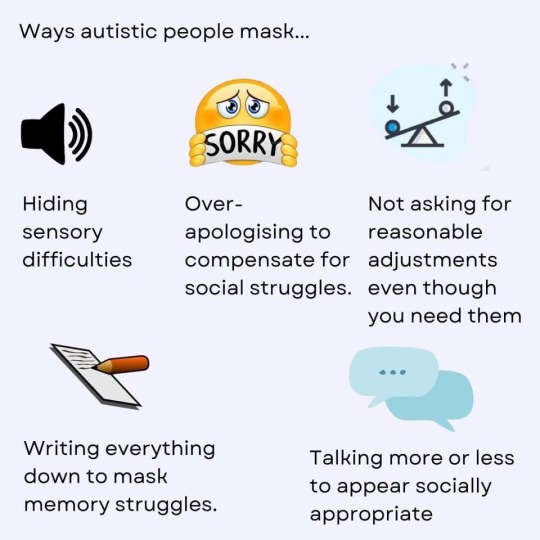
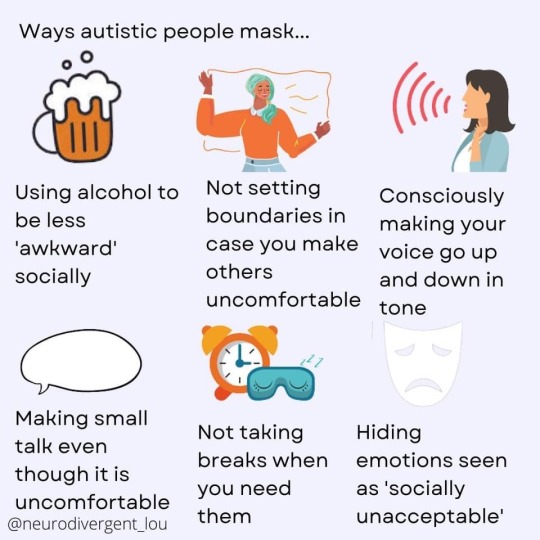
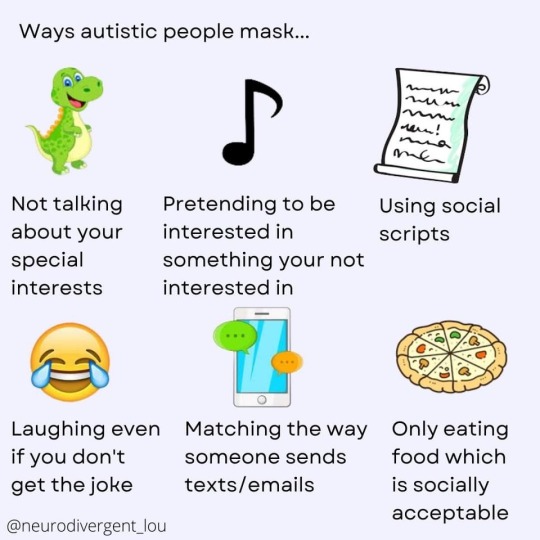


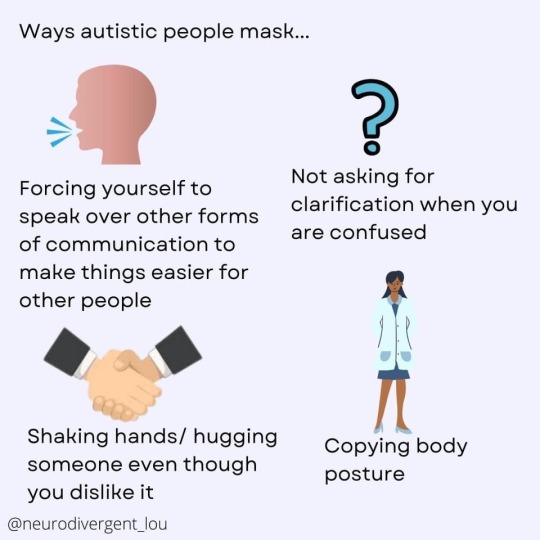
Neurodivergent_lou
#autism#actually autistic#autism awareness month#autism acceptence month#masking#masking without realizing#example of masking#neurodivergence#neurodiversity#actually neurodivergent#feel free to share/reblog#neurodivergent_lou (Facebook)
3K notes
·
View notes
Text
Kind of related to that post I made a couple days ago but I love you people who make “odd” animal-like noises, especially people who don’t do that on purpose, I love you people who growl when they’re frustrated, I love you people who mimic the animals around them, I love you people who bare their teeth when feeling threatened/on edge, I love you people who make purring noises when they’re happy/satisfied
#Esrah talks#I used to get flack for that so I don’t really do it anymore but some of this is basically second nature to me#and because of people making dehumanizing comments and stuff about that it kind of scares me when I can’t mask that#so this is positivity for people like me#I love you I love me I love us#actuallyautistic#autistic positivity#<- since this is why I do it
12K notes
·
View notes
Text
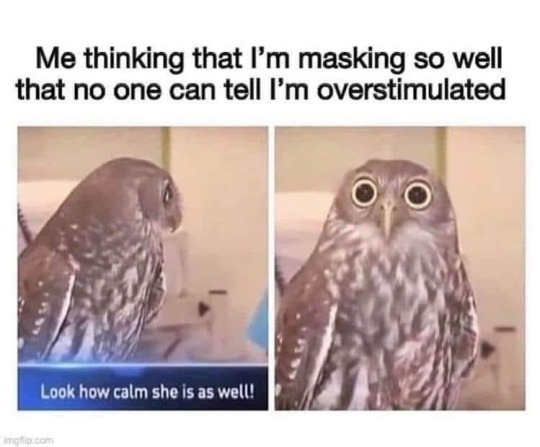
7K notes
·
View notes
Text
Autiezon - Neurodiversity Resource List... a Living Document Pt. 1 of 8
[Last Updated: Sunday, February 26, 2023 at 6:35 AM]
Note: The following list is a living document that will be added to as new resources are discovered by the writer of this list. These resources were used by Alizon (AKA @Autiezon) in compiling her presentation(s) regarding Neurodiversity; as part of her personal journey as an Autistic; and as a running list she can share with others as she learns more about a variety of neurotypes. This list is not intended to be exhaustive and new additions and changes are always welcome. Message @Autiezon if you have any questions or concerns regarding this list or have a resource you would like to direct attention to.
Note from @Autiezon:
These are resources I personally have read and gleaned useful information from. It doesn't mean I agree with everything said in them, but it does mean each is a voice I have heard and for me that means, I learned something and I think someone else might too.
For context...
Be aware, that the presentations I typically do have been in the financial services sector. Not all resources below are relevant to that sector, but this fact does inform some of this list. So, when you say, "What the heck is with all the finance stuff?"
This is the reason why. I hope you enjoy this list and if there are resources you just can't find, I have a very good talent for finding obscure stuff, so let me know, in the comments and maybe I can find a resource for you. I really love doing that.
I love you my Neurodivergent Folk!
Sincerely,
@autiezon
List to follow in next post...
1 note
·
View note
Text
hate when ppl only view being autistic/adhd/neurodivergent as a bad thing
bc yes i will have a breakdown if it is to loud or a noise is to high
but also the other day i listened to a song and it triggered the happy chemicals and spent thirty minutes jumping around my room and spinning and stimming and it was literally the happiest ive ever been in years
#fairly certain this was a result of my audhd#geniunely the happiest ive been it at least 3 years#think my depressions starting to actually get better#should start demasking more#its to bad my mask is deeply ingrained in my identity lmao#autism#audhd#neurodivergent#adhd#actually autistic#actually adhd
5K notes
·
View notes
Text
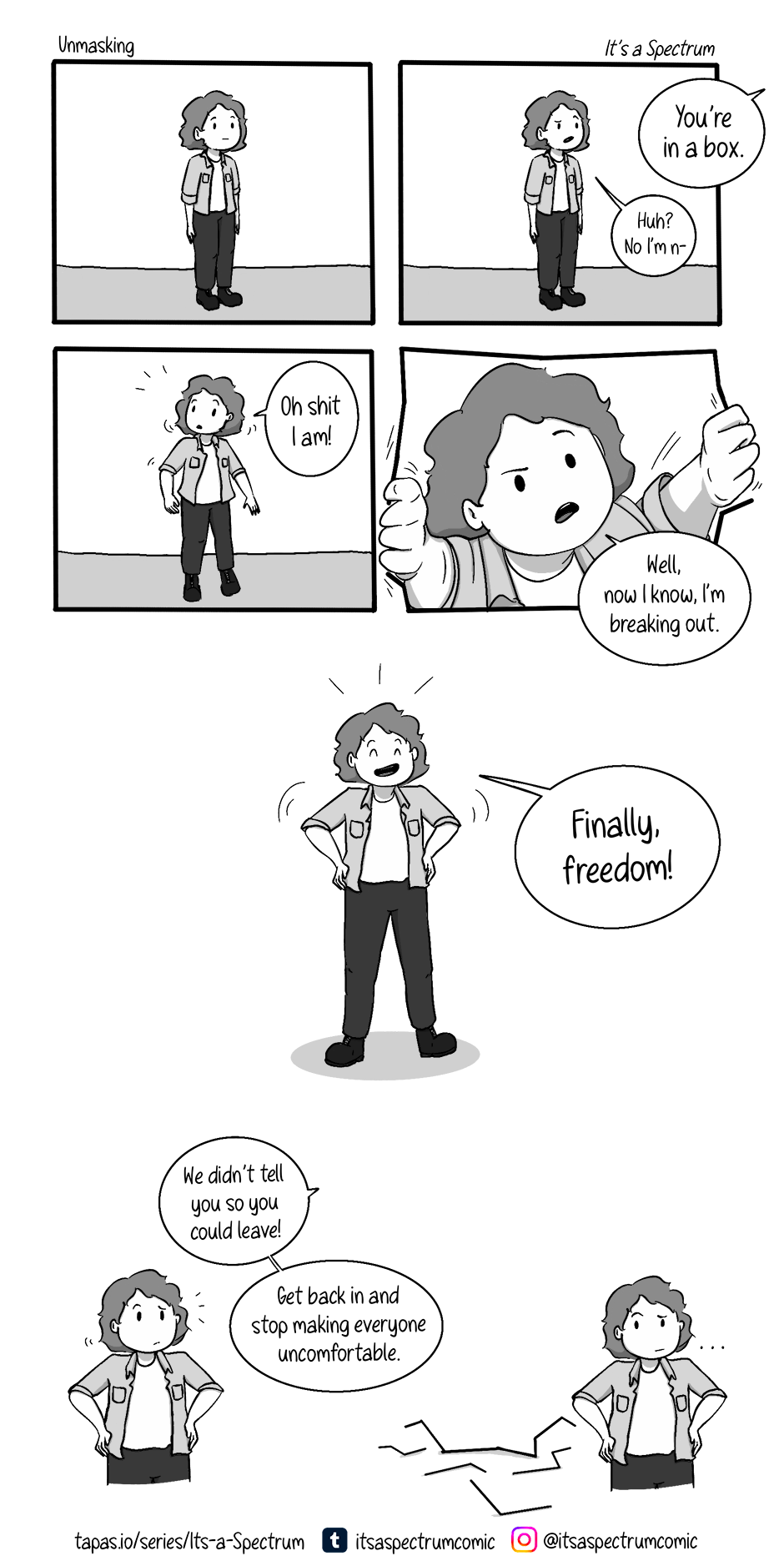
Whoops I destroyed my cage and now I couldn't go back if I wanted to
#autism comic#actually autistic#autobio comics#masking#unmasking#autistic#its a spectrum#edited to include links
3K notes
·
View notes
Text
anyone else stay home for a while and be like "hmmmm been acting fine lately. maybe i'm not autistic." and then you have one (1) social interaction and you're like ah. the Autism strikes again.
#just me or#any of y'all get it#autism#actually autistic#autistic#audhd#adhd#neurodivergent#neurodiversity#nd#neurotypicals#autism experiences#me when i#autism tm#late diagnosed autistic#late diagnosed adhd#late diagnosed everything tbh#nd experiences#masking#sensory issues#spd
3K notes
·
View notes
Text
I truly wish I could get cis people and non-butches to understand how inherent transness/butchness/gender-nonconformity is for so many of us, specifically related to how visible it can be even when we do our damndest to hide it.
My parents suggested I detransition/try to appear “womanly” because it’s getting really dangerous where I live, and I’m just like…there is no world in which I can make that work. I was getting called a lesbian and a dyke as a teen before I even figured out I was gay. I was shoved up against a wall in college and sexually assaulted in public when I was in the process of coming out and presenting very femininely, specifically because I was a lesbian. Even when I spent hours playing with makeup because it was kind of fun (because I did wacky styles that make me think I was using it as a drag thing more than anything) I still stuck out next to cishet girls.
I’m not saying I can’t do things to improve my safety, but I have been butch/trans/gender-nonconforming my entire life. I cannot undo that from the fabric of who I am; even if I cover it up, the people who want to do harm can typically still pick up on it.
#it’s probably also an autistic thing! cause femininity was very much part of my attempt at masking and it did not work.#butch#trans#gender nonconforming#butch lesbian#butch dyke#trans butch#transmasc butch#transmasc lesbian#transmasc#nonbinary lesbian#nonbinary#lesbian#dyke#tw sa mention
5K notes
·
View notes